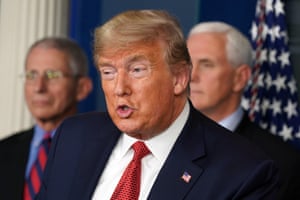A New York Times piece by a diet specialist appears to have informed Trump’s idea to open up the country by Easter

Photograph: Sarah Silbiger/EPA
At the start of this week, as millions were following US government advice to combat the coronavirus pandemic by physical distancing and staying indoors, Donald Trump abruptly declared that people needed to soon return to work.
“At a certain point we have to get open and we have to get moving. We don’t want to lose these companies. We don’t want to lose these workers,” Trump said at a White House press conference. Trump said this was going to happen “very soon”.
The policy of returning to normal, nearly all epidemiologists warn, carries a threat of catastrophe: of allowing the virus to spread just as the measures proven to curb it are starting to work.
So where did Trump’s U-turn come from?
As frequently is the case with Trump’s political ideas, he seems to have been inspired – at least in part – by Fox News, and also by thinkpieces popular among conservatives, but often not written by epidemiologists.
On Sunday, the Fox News host Steve Hilton railed against the idea of long-term social distancing. Hilton claimed “working Americans” will be “crushed” by an indefinite work shutdown. Hilton mused that there could be a situation where “the cure is worse than the disease”.
Within hours, the Fox News message found its intended target. On Sunday evening Trump tweeted, mangling Hilton’s words slightly: “WE CANNOT LET THE CURE BE WORSE THAN THE PROBLEM ITSELF.”
The idea of sending people back to work and restarting the economy had been floating around last weekend, propagated by two opinion pieces in particular. One was written on Medium. Another, published two days before the Hilton show, was an opinion piece by David Katz, a former director of the Yale-Griffin Prevention Research Center, which was published by the New York Times. Given the reach of the New York Times this piece, headlined Is Our Fight Against Coronavirus Worse Than the Disease?, attracted huge attention.
In the piece, Katz argues that those over 60 and those who are immunologically compromised should be “preferentially protect[ed]”, with focused testing.
“This focus on a much smaller portion of the population would allow most of society to return to life as usual and perhaps prevent vast segments of the economy from collapsing,” Katz wrote, adding that then children could return to school and adults return to their jobs.
In time, people would develop immunity to the coronavirus, and in the meantime, damage to the economy would be minimized, Katz opined.
But as many pointed out, Katz is not an epidemiologist. Instead, he specializes in nutrition advice, and has published a number of dietary books, including The Way to Eat, Cut Your Cholesterol and Stealth Health.
Katz’s piece was shared widely among conservatives, including by Fox News host and informal Trump adviser Pete Hegseth. The article served as a handy tool for conservatives advancing the argument that the economy shouldn’t be sacrificed for coronavirus containment.
A group of Yale epidemiologists swiftly wrote a letter to the Times, rebutting Katz’s piece. Others pointed out Katz’s lack of credentials and his links to big industry. He was once paid $3,500 an hour as an expert witness in a Chobani legal case to defend the sugar contained in its yoghurts.
Katz has received hundreds of thousands of dollars from companies including Hershey’s, Kind Bars, the walnut industry and Quaker Oats. The science journalist Nina Teicholz has written about how in some cases, Katz wrote positive articles about those companies after receiving grants.
“Dr Katz’s efforts on behalf of public health during this pandemic are uncompensated and born from a sense of duty and commitment to public health,” a spokeswoman for Katz told the Guardian. She pointed to a post Katz wrote on LinkedIn following the criticism, where he stresses how damage to the economy is also a massive public health issue.
Yale itself went to lengths to distance itself from Katz. “David Katz is not academically affiliated with Yale and has not held an academic appointment here since 2016,” the university posted on Twitter.
Gregg Gonsalves, an assistant professor of epidemiology at the Yale school of public health, said: “Yes, the elderly are at risk. But the ability to sequester safely for months on end, in the United States is untenable. We don’t have a social safety net that maybe continental European countries have.”
He said: “The other thing is, low risk doesn’t mean no risk. We don’t know the natural history of the disease well enough to say: ‘Everybody under 65 is A-OK and ready to go back to work.’”
Katz’s piece wasn’t the sole inspiration for Trump’s change of mind. The influential Fox News host Laura Ingraham and others eagerly shared a Medium article written by a tech worker named Aaron Ginn over the weekend, which advances some of the same ideas as Katz.
Medium later took the article down after widespread criticism, including from experts in infectious diseases.
The concept of trading off self-isolation for returning to normal to help the economy has also been pushed by Trump’s cabinet including, his economic adviser Larry Kudlow, who on Tuesday told reporters: “Public health includes economic health.”
The arguments advanced by Katz and others, however, are a piece of a movement which could lead to Trump flip-flopping again on the seriousness of the coronavirus – which could be problematic for all.



